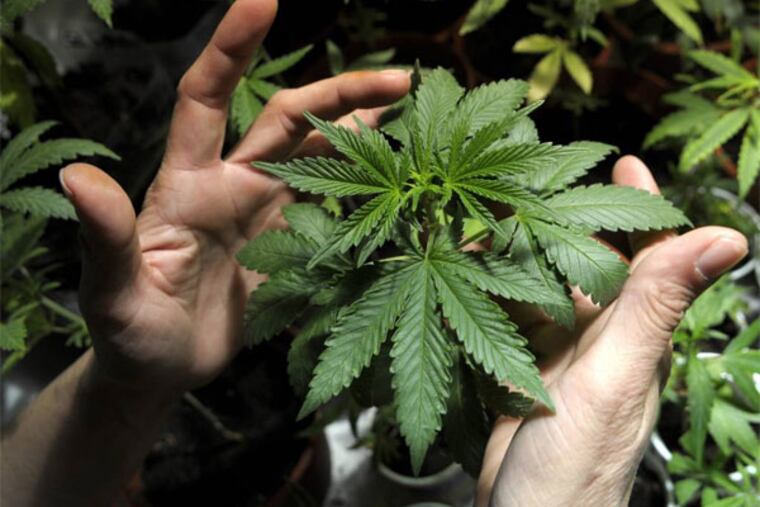New PA medical marijuana bill: All spark and no fire?

There's a new buzzword in Harrisburg: CBD.
Suddenly two state Senators have realized that marijuana is filled with medically beneficial components called cannabinoids and not all of them produce a high. Daylin Leach (D-Montgomery) and Mike Folmer (R- Lebanon) have just caught wind of the single compound called Cannabidiol or CBD that has been recognized by medical cannabis providers in America for decades.
Modern compassionate access programs operating in Maine, Rhode Island, Michigan and Colorado regularly test for cannabinoid content in specific strains of marijuana: labeling CBD and others for patients and medical providers. CBD provides a remarkable benefit for a variety of conditions, especially those with severe seizure disorders.
Parents in Pennsylvania whose young children suffer from seizures every day have been preparing to move to Colorado to have access to cannabis treatment. But they have made one last attempt to lobby legislators. Senators Folmer and Leach have heard their plea and crafted a bi-partisan plan to help these kids championing CBD.
But CBD does not work alone. A compassionate use law only works if it means legalizing everything in Cannabis.
Organic Chemistry
More than eighty different cannabioinds have been discovered in the cannabis plant; these interact with a variety of specialized receptors, not just in the brain but throughout the human body (and in animals). Almost everyone reading this knows about one important cannabinoid: THC. But good old Delta-9 Tetrahydrocannabinol does not just cause a person to laugh at cartoons; is also a well-documented anti-inflammatory, anti-nausea therapy and appetite stimulant.
First isolated in 1964 at Hebrew University in Israel by Professor Raphael Mechoulam THC is the cannabinoid longest studied by science with published clinical data showing a wide range of known medicinal benefits.
In fact the only cannabinoid commonly prescribed doctors, marketed as Marinol (dronabinol), is a 100% pure dose of synthetic THC in a pill deemed safe by the FDA. But patients over the years have encountered a laundry list of complaints about the single-cannabinoid pill made from chemicals.
CBD has particularly powerful anti-inflammatory and anti-oxidant properties for sure along with the apparent lack of "euphoric" affect. Strains of cannabis have been carefully bred in America and Europe to produce high levels of CBD. Following the volume of remarkable reports from patients, CBD has been intensely studied in recent years by mainstream physicians and scientists.
Patients can smoke these strains to ingest CBD, but a new approach has also evolved: extraction. It is possible, with the most advanced laboratory equipment, to pull out the cannabinoids from raw plants and then separate them by component.
Hundreds of medical cannabis dispensaries in more than a dozen states perform extraction and market hash oils or cannabis oils with very high CBD content and very low THC content. But complete isolation is still the work of expensive research labs. So far only a few such laboratories exist anywhere in the world. Yet there is an important factor: cannabinoids like CBD and THC work best together.
A pure dose of politics
Skot Vaselick (name altered for privacy) is a registered, card carrying medical marijuana patient in Sussex Co., New Jersey. But that did not stop the Sparta Police department from arresting him for a few grams of cannabis and a small metal pipe. The local prosecutor has not yet dropped the charges.
At the time Skot encountered the police, none of the much heralded "Alternative Treatment Centers" was open for business. The Garden State's extraordinarily limited medical marijuana law does not allow patients to possess "street" cannabis.
Skot has not been alone. Numerous registered patients in New Jersey report being arrested. The compassionate use law has failed to fulfill its most powerful intent: legal protections for seriously ill residents.
Under restrictive laws that limit cultivation, qualifying conditions and even cannabinoids (N.J. has a 10% cap on THC) patients invariably seek therapy underground and get arrested for it.(Philly420 plans to follow up on Skot's case in depth next week.)
Groundhog Day with weed
Senators Folmer and Leach are following in the footsteps of the best bi-partisan intentions in Connecticut, Delaware and New Jersey. Republicans and Democrats in these states took three to five years to pass compassionate use laws, holding press conferences the entire way with heartbreakingly ill residents.
The laws were passed in those states, the cameras stopped rolling and patients have now endured years of regulatory delay. Four years since the Compassionate Use Medical Marijuana Act of New Jersey was signed into law, only a few hundred patients have been able to purchase small amounts of expensive, taxed cannabis. The best political intentions did not result in the best programs.
Medical cannabis is evolving quickly as an industry, in science and in law. There are many nuances involved like cannabis oils, extracts, tinctures and edibles along with keeping the dried flowers pesticide free. We can observe success and failures in the effort to get programs that really work.
In order to fulfill a promise in Pennsylvania for cannabis therapy we need a robust law that takes into account the experience of other states. The children that our Senators wish to help cannot wait a decade for the Commonwealth to offer the therapy. What works best does not take a masters degree in medicine or chemistry: What works best is granting legal access to the entire cannabis plant.